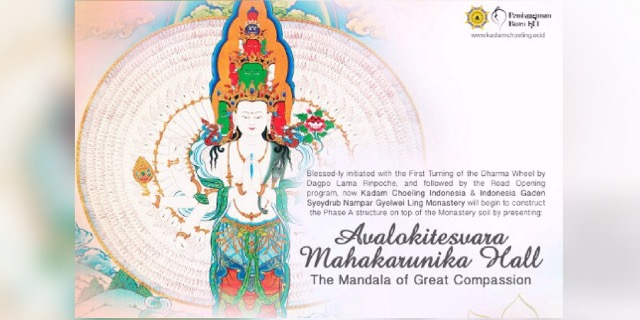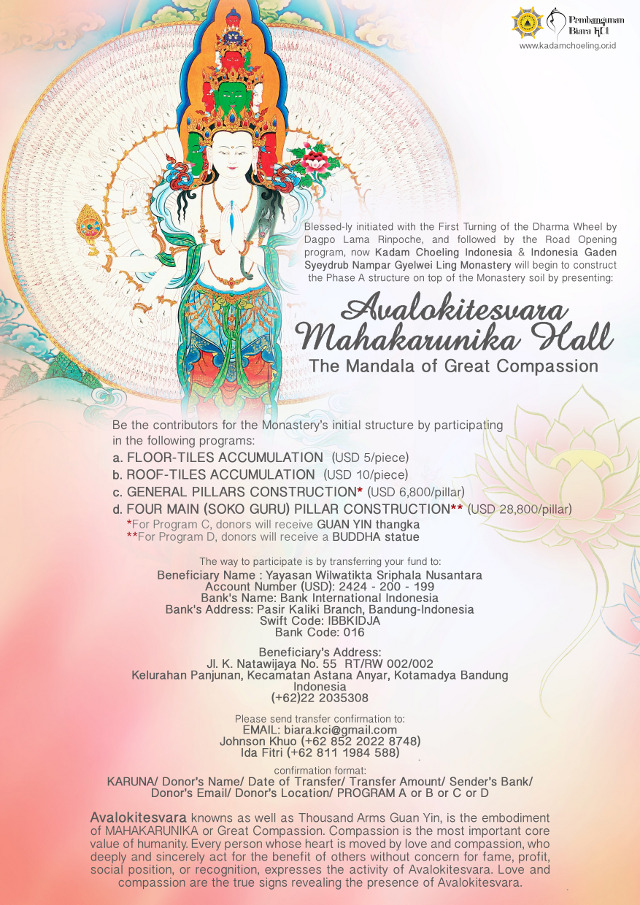
Wherever there is Great Compassion Mahakarunika, All the Other Qualities will Appear
Compassion is the entrance to the Mahayana. Showing the root of the Mahayana path is compassion has three parts: the importance of compassion in the beginning, in the middle, and at the end. The glorious Candrakirti taught that just as seeds, water, and ripening are important in the beginning, middle, and end of a harvest, similarly compassion is important in the beginning, middle, and end of the harvest of buddhahood.
Compassion is important in the beginning because feeling responsible to free all beings requires great compassion. Just as the movement of the breath is the prerequisite for the life force of a human being, the great compassion of the bodhisattvas is the prerequisite for correctly reaching the Mahayana.
In the middle, by accustoming yourself to increasingly greater compassion that is not just a one-time development, you become less concerned with your own happiness or suffering and are not discouraged at providing others’ welfare.
At the end, based on the power of great compassion, buddhas, even when they reach their goal, do not abide in peace like Hinayana practitioners, but continue to work for the welfare of beings as long as space remains.
Below is the excerpt from The Great Treatise on the Stages of the Path to Enlightenment (Lamrim Chenmo), Volume Two, by Tsong-kha-pa on the qualities and importance of compassion.
1. The importance of compassion in the beginning
Once your mind is moved by great compassion, you will definitely make the commitment to free all living beings from cyclic existence. If your compassion is weak, you will not. Therefore, compassion is important in the beginning because feeling responsible to free all beings requires great compassion and because, if you do not take on this responsibility, you are not ranked as a Mahayana practitioner. In this vein, the Teachings of Aksayamati Sutra (Aksayamati-nirdesa-sutra) states:
Furthermore, Venerable Sariputra, the great compassion of the bodhisattvas is inexhaustible. Why? Because it is the prerequisite. Venerable Sariputra, just as the movement of the breath is the prerequisite for the life force of a human being, the great compassion of the bodhisattvas is the prerequisite for correctly reaching the Mahayana.
Also the Foremost of Gaya (Gaya-sirsa) states:
“Manjusri, what is it that motivates the bodhisattvas deeds? What is its object?” Manjusri said, “Devaputra, great compassion motivates the bodhisattva deeds; its object is living beings.”
Thus compassion is the basis of engaging in the deeds because when you see that you will not live up to your commitment without training in the two vast collections, you set about the difficult work of amassing these vast collections.
2. The importance of compassion in the middle
You may develop the spirit of enlightenment at one time and then engage in the bodhisattva deeds. But when you see that living beings are innumerable and act improperly, that the training is very difficult and limitless, and that you need an immeasureable length of time, you may lose heart and fall into the Hinayana. However, by accustoming yourself to increasingly greater compassion that is not just a one-time development, you become less concerned with your own happiness or suffering and are not discouraged at providing others’ welfare. Therefore, you easily accomplish all the collections. Kamalasila’s first Stages of Meditation (Bhavana-krama) states:
Because bodhisattvas are moved by great compassion, they diligently strive to be very helpful to others without considering themselves. Consequently, they engage in accumulating the two collections, which is very difficult, tiring, and requires a long period of time. As the Seal of Engaging in Developing the Power of Faith Sutra (Sraddha-baladhanavatara-sutra) says:
One who has great compassion will always take on a life of suffering and will always give up a happy life in order to help all living beings to mature.
If bodhisattvas engage like this in something that is extremely difficult to do, they will fully and quickly complete the collections. They will definitely attain the high state of omniscience. Therefore the sole root of a buddha’s qualities is compassion.
3. The importance of compassion at the end
Based on the power of great compassion, buddhas, even when they reach their goal, do not abide in peace like Lesser Vehicle practitioners, but continue to work for the welfare of beings as long as space remains. For, without compassion buddhas would be like sravakas. Kamalasila’s second Stages of Meditation says:
Since the bhagavan buddhas are imbued with great compassion they remain until the end of the realm in which beings dwell, even though they have attained the complete perfection of their own aims.
And also:
The sole cause of the non-abiding nirvana of the bhagavans is great compassion.
The glorious Candrakirti taught that just as seeds, water, and ripening are important in the beginning, middle, and end of a harvest, similarly compassion is important in the beginning, middle, and end of the harvest of buddhahood. His Commentary on the “Middle Way” (Madhyamakavatara) states:
Compassion alone is regarded as the seed of a conqueror’s excellent harvest,
As water for its development,
And as the maturation in a state of long enjoyment.
Therefore at the beginning I praise compassion.
With this powerful idea in view, the Compendium of the Teachings Sutra (Dharma-samgiti-sutra) says:
Bhagavan, bodhisattvas should not learn many teachings. Bhagavan, if bodhisattvas grasp and know one teaching, they will have all the Buddha’s teachings in the palm of their hand. What is this one teaching? It is great compassion.
Bhagavan, with great compassion all the Buddha’s teachings are in the bodhisattvas’ palm. For example, Bhagavan, wherever the precious wheel of a universal sovereign is, there also is the assembly of his battalions. Likewise, Bhagavan, wherever the bodhisattvas’ great compassion is, there are all the Buddha’s teachings. For example, Bhagavan, once there is a life force, all the other sensory faculties will exist. Bhagavan, similarly, once great compassion exists, all the other bodhisattvas’ qualities will appear.
Once you become convinced that compassion is the excellent key to the path through such proof as reason and limitless scriptures, why would you not hold the spirit of enlightenment together with its root—compassion—to be the supreme instruction? The teacher Shang-na-chung (Zhang-sna-chung) said, “Even though I asked for instructions from the Great Elder [Atisha], he said nothing except: ‘Renounce the world; cultivate the spirit of enlightenment.” Upon hearing this, Geshe Drom-dön-ba (dGe-bshes ‘Brom-ston-pa-rgyal-ba’i-‘byung-gnas) was embarrased for him and said, “You received the Great Elder’s ultimate instruction!” Geshe Drom-dön-ba understood the core of the teaching.
This conviction is very difficult to achieve, so you must seek a stable and certain knowledge by repeatedly clearing away sins, accumulating merit, and reading scriptures such as the Array of Stalks Sutra and the commentaries. The glorious Matrceta’s Praise in One Hundred and Fifty Verses (Sata-pancasatka-stotra) says:
Only you, O hero [Buddha], know your precious spirit,
The seed of perfect enlightenment,
To be the quintessence;
No one else can reach this certainty.
